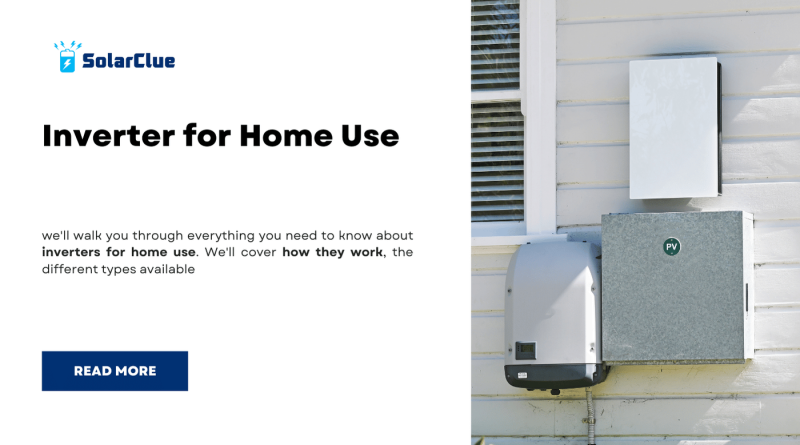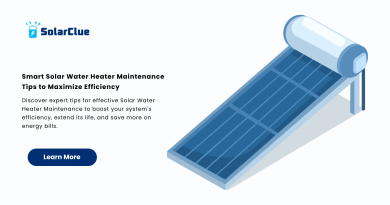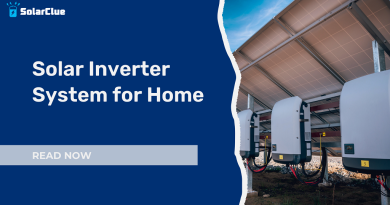Inverter for Home Use
Power cuts can be frustrating, especially when you’re in the middle of important tasks. Whether you’re working from home, cooking, or just relaxing, losing electricity can disrupt your day. Luckily, an inverter for home use can be a game-changer. It provides a backup power solution that keeps essential appliances running smoothly, even during outages.
In this blog post, we’ll walk you through everything you need to know about inverters for home use. We’ll cover how they work, the different types available, and what to consider before buying one. Whether you’re new to inverters or looking to upgrade your system, this guide will help you make an informed choice.
Table of Contents
What is an Inverter for Home Use?
An inverter is an electronic device that converts direct current (DC) from a battery into alternating current (AC), which is the type of electricity most home appliances use. In simple terms, it takes the stored energy in the battery and supplies it to your appliances when the grid power goes out.
For home use, inverters are generally designed to handle basic electrical needs such as powering lights, fans, televisions, and smaller kitchen appliances. They are a lifesaver during power outages, especially in areas where blackouts are frequent.
How Does an Inverter for Home Use Work?
An inverter for home use works in a few simple steps:
- Charging the Battery
The inverter connects to the mains electricity supply. When there is no power outage, it charges its battery using the power from the grid. - Automatic Switch Over
When there is a power cut, the inverter automatically switches to battery mode. This switch is often so quick that you may not even notice the change. - Power Supply
The inverter then supplies power from the battery to the connected appliances. How long the inverter can supply power depends on the battery capacity and the power load. - Recharging
Once the electricity is restored, the inverter goes back to charging its battery, ensuring it’s ready for the next outage.
Types of Inverters for Home Use
Choosing the right type of inverter depends on your power needs. Here are the main types of inverters you’ll come across:
- Square Wave Inverter
These are the most basic types of inverters and are generally cheaper. They work well for basic appliances like lights and fans but may not be suitable for sensitive electronic devices like computers and TVs. - Modified Sine Wave Inverter
These inverters provide a smoother output and can handle more complex appliances like refrigerators and computers. However, they might still cause issues with highly sensitive equipment. - Pure Sine Wave Inverter
A pure sine wave inverter is the best choice for home use if you want to power sensitive electronics without any risk of damage. It mimics the smooth wave of electricity that comes from the grid, making it perfect for all household devices.
Benefits of Using an Inverter for Home Use
- Uninterrupted Power Supply
With an inverter, you won’t have to worry about power cuts disrupting your daily activities. It provides backup power instantly, ensuring that your essential devices stay on. - Affordable and Convenient
Compared to generators, inverters are more affordable and easier to maintain. They are also quieter and don’t require fuel, making them a more convenient option for homes. - Eco-Friendly Option
Many inverters can be connected to solar panels, making them a green energy option for homeowners looking to reduce their carbon footprint. - Protects Sensitive Devices
With a pure sine wave inverter, you can safely run sensitive electronics like computers, TVs, and kitchen appliances without the risk of damaging them.
Choosing the Right Inverter for Your Home
When selecting an inverter for home use, here are some factors you should consider:
- Power Requirements
The first step in choosing an inverter is calculating your home’s power requirements. You need to know how many watts your essential appliances use so you can select an inverter with the right capacity. Most households need inverters with a capacity of 800 to 1500 watts to run essential devices like lights, fans, and small appliances. - Battery Capacity
Battery capacity is key to how long your inverter can supply power during an outage. Batteries are measured in ampere-hours (Ah), and the higher the Ah rating, the longer the inverter will last. For most homes, a battery capacity of 100Ah to 150Ah should suffice for moderate power outages. - Battery Type
There are two main types of batteries used with inverters: tubular and flat-plate batteries. Tubular batteries are more efficient and have a longer life, making them a better investment in the long run. Flat-plate batteries are cheaper but may not last as long. - Waveform Type
As mentioned earlier, pure sine wave inverters are the best option for home use because they offer a smooth power output that is safe for all appliances. Square wave and modified sine wave inverters are more affordable but may not be suitable for sensitive devices.
Comparison of Different Inverter Types for Home Use
| Inverter Type | Best For | Price Range | Suitability for Sensitive Devices | Efficiency |
|---|---|---|---|---|
| Square Wave | Basic appliances like lights, fans | Low | Not suitable | Low |
| Modified Sine Wave | Basic to moderate appliances | Medium | Moderate suitability | Medium |
| Pure Sine Wave | All appliances, sensitive devices | High | Best for sensitive devices | High |
Installation and Maintenance Tips
- Installation
Installing an inverter for home use is relatively straightforward, but it’s always a good idea to hire a professional for the job. This ensures that the wiring is done correctly and there’s no risk of electrical hazards. If you’re planning to use solar panels with your inverter, a professional can help set up the system for maximum efficiency. - Maintenance
Inverters require minimal maintenance. Regularly checking the battery’s water level, keeping the unit clean, and ensuring there are no loose connections are enough to keep it functioning smoothly. If you notice any performance issues, consult a technician for further inspection.
Solar-Compatible Inverters for Home Use
One of the most eco-friendly and cost-effective ways to use an inverter is by connecting it to solar panels. A solar inverter can store energy produced by the sun and supply it during power cuts. This not only reduces your reliance on the grid but also lowers your electricity bills in the long run.
For those looking to go green, investing in a solar-compatible inverter is a wise choice. Solar inverters work similarly to regular inverters but have the added benefit of drawing power from the sun instead of the grid.
Conclusion
Inverters for home use are a must-have in today’s world where power outages can happen at any time. They provide an efficient, cost-effective, and eco-friendly solution to keep your essential appliances running without disruption. Whether you’re powering basic lights and fans or running more complex electronics like computers and TVs, there’s an inverter for every need.
Choosing the right inverter for your home is all about understanding your power requirements and selecting a unit that meets those needs. With various types of inverters available, from square wave to pure sine wave, you have options that suit both your budget and your household needs. Now that you know how inverters work, their benefits, and what to look for, you’re ready to make an informed decision for your home’s power backup needs.
Visit SolarClue® to see the best Solar Inverter. SolarClue® actively sells solar energy products at discounts of up to 50% on its online marketplace.




